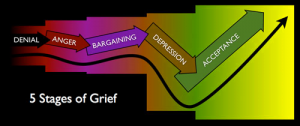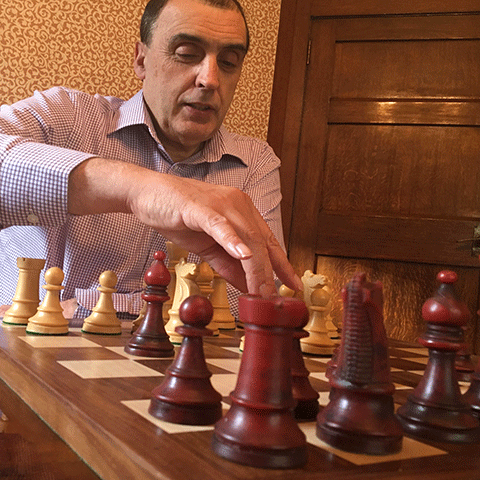There are said to be five stages of Loss and Grief: Shock and Denial; Anger; Dialogue and Bargaining; Depression and Detachment; Acceptance. Loss of a loved one aside, nowhere do these apply more than to a game of chess.

Shock and Denial
A few moves ago, you had a great position and everything was going fine. How can things have gone downhill so quickly? It’s not as though he played any moves that weren’t obvious to see. There was nothing at all wrong with the simpler move you were originally going to play. What in the World possessed you to deviate and play a move that saddled you with problems that you can’t deny you were aware of. If only you could wind the game back a couple of moves and play what you had intended. But for a moment of lapse, there is no way that you would have played a move that had such obvious shortcomings.
Why did you play the opening variation anyway? There were at least half a dozen alternatives that would have left you in a completely tenable, if not better, position. Worse still, it is not so long ago that you had convinced yourself that you should play a different opening entirely. One that a number of YouTube videos had confirmed with one another, offered much greater promise. Certainly, the alternative would not have left you in your current predicament.
Anger
Just look at him, your opponent. He knows that you were doing perfectly well up until a couple of moves ago. The smile that he had exchanged for yours before the game now showed a darker side with evidence of a disguised smugness that you had somehow failed to notice earlier.
You would never dream of wiping the pieces off the board with one deeply satisfying sweep of your arm, making a scene, but you can at least now find some sympathy for the many before you that have not had the benefit of the same constraint.
Dialogue and Bargaining
If it is dialogue you are looking for, there are many better outlets for it than chess; indeed, it is hard to think of a worse one. Although you might feel good cause for defending your current position, your eagerness to verbalize them is unlikely to be shared by anyone around you; they are engrossed in their own much more enjoyable games. You have little choice but to encapsulate your rhetoric into the single permissible word. “Draw?”, you hear yourself plead without any true conviction.
The most amusing response I have ever seen was between two juniors many moons ago. After his ambitious offer had been declined, he responded with “Right! you wait ’til you want one next time”. The memory allows a smile; small respite from the situation before the reality returns to remind, you are that boy. The whole injustice of the situation would be wiped clean if he would but offer his hand and concur with your slightly biased analysis but you know that he won’t. If you’re honest, you know that you wouldn’t either if the situation was reversed.
Depression and Detachment
Everyone around you is oblivious. They are all sitting in the same calm that you had been enjoying up until very recently. The whole place is at gentle peace. Pairs of content looking players sit across the chequered board from one another entranced by the metronomic ticking of the clocks. Soon, others will have similar despondency as they fall victim but for now, you are the unhappiest person in the room.
Acceptance
Finally, acceptance takes hold. Even with a little imagination, it is hard to see how your opponent could play badly enough to lose in the current position so resigned, your hand makes its way to your King to lay it on its back. “Well played”, you offer automatically through a long groomed social grace, trying your best to sound genuine. You are suddenly aware of your hand in front of you which you can’t fully remember offering but is now being shaken by your opponent. He has won, you have lost. Shortly, you will be responding to a series of questioning looks from your team mates. An expression of gloom and self-pity will be comforted by the briefest gestures of condolence.
There are said to be five stages of Loss and Grief. I can confirm this to be true. I guess all chess players can.
